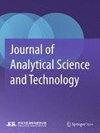Exploring the feasibility of a single-protoplast proteomic analysis
IF 2.8
4区 化学
Q3 CHEMISTRY, ANALYTICAL
引用次数: 0
Abstract
Recent advances in high-resolution mass spectrometry have now enabled the study of proteomes at the single-cell level, offering the potential to unveil novel aspects of cellular processes. Remarkably, there has been no prior attempt to investigate single-plant cell proteomes. In this study, we aimed to explore the feasibility of conducting a proteomic analysis on individual protoplasts. As a result, our analysis identified 978 proteins from the 180 protoplasts, aligning with well-known biological processes in plant leaves, such as photosynthetic electron transport in photosystem II. Employing the SCP package in the SCoPE2 workflow revealed a notable batch effect and extensive missing values in the data. Following correction, we observed the heterogeneity in single-protoplast proteome expression. Comparing the results of single-protoplast proteomics with those of bulk leaf proteomics, we noted that only a small fraction of bulk data was detected in the single-protoplast proteomics data, highlighting a technical limitation of the current single-cell proteomics method. In summary, we demonstrated the feasibility of conducting a single-protoplast proteomic experiment, revealing heterogeneity in plant cellular proteome expression. This underscores the importance of analyzing a substantial number of plant cells to discern statistically significant changes in plant cell proteomes upon perturbation such as abscisic acid treatment in future studies. We anticipate that our study will contribute to advancing single-protoplast proteomics in the near future.探索单个细胞质蛋白质组分析的可行性
高分辨率质谱技术的最新进展使得单细胞蛋白质组的研究成为可能,从而揭示了细胞过程的新方面。值得注意的是,此前还没有人尝试过研究单株植物细胞蛋白质组。在这项研究中,我们旨在探索对单个原生质体进行蛋白质组分析的可行性。结果,我们从 180 个原生质体中鉴定出 978 个蛋白质,与植物叶片中众所周知的生物过程(如光合系统 II 中的光合电子传递)相吻合。在 SCoPE2 工作流程中使用 SCP 软件包后,发现数据中存在明显的批次效应和大量缺失值。经过校正,我们观察到了单原生质体蛋白质组表达的异质性。将单细胞蛋白质组学的结果与大体叶片蛋白质组学的结果进行比较,我们发现单细胞蛋白质组学数据中只检测到了一小部分大体数据,这凸显了当前单细胞蛋白质组学方法的技术局限性。总之,我们证明了进行单原生质体蛋白质组学实验的可行性,揭示了植物细胞蛋白质组表达的异质性。这强调了在今后的研究中分析大量植物细胞的重要性,以便在脱落酸处理等扰动下发现植物细胞蛋白质组在统计学上的显著变化。我们预计,我们的研究将在不久的将来推动单原生质体蛋白质组学的发展。
本文章由计算机程序翻译,如有差异,请以英文原文为准。
求助全文
约1分钟内获得全文
求助全文
来源期刊

Journal of Analytical Science and Technology
Environmental Science-General Environmental Science
CiteScore
4.00
自引率
4.20%
发文量
39
审稿时长
13 weeks
期刊介绍:
The Journal of Analytical Science and Technology (JAST) is a fully open access peer-reviewed scientific journal published under the brand SpringerOpen. JAST was launched by Korea Basic Science Institute in 2010. JAST publishes original research and review articles on all aspects of analytical principles, techniques, methods, procedures, and equipment. JAST’s vision is to be an internationally influential and widely read analytical science journal. Our mission is to inform and stimulate researchers to make significant professional achievements in science. We aim to provide scientists, researchers, and students worldwide with unlimited access to the latest advances of the analytical sciences.
 求助内容:
求助内容: 应助结果提醒方式:
应助结果提醒方式:


